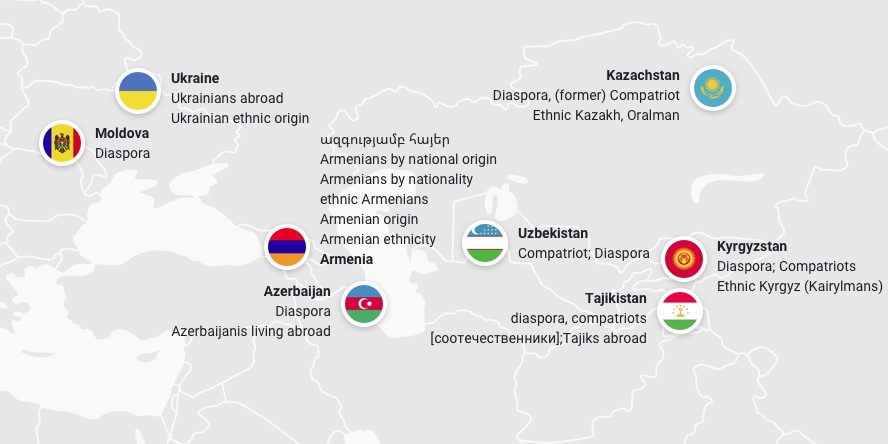Eastern Europe & Central Asia
This page provides an overview of diaspora engagement in the Eastern Europe and Central Asia (EECA) region. It draws on knowledge gathered during the mapping of 10 countries to study relevant policy and institutional frameworks, trends, good practices and recommendations at regional level. A long-form version of this regional overview is available to download in English and Russian.
All 10 EECA counties mapped have a common past: they are all countries that gained their independence after the collapse of the USSR in 1991. This has direct implications for their diaspora and migration policies as most of EECA countries have ‘new’ diasporas that were born after the fall of the Iron Curtain and communism in the 1990s.
Diaspora engagement was quickly institutionalised after dissolution of the Soviet Union. Half of the countries now have a dedicated institution, six permit dual citizenship and three have a specific diaspora engagement policy.
Although there is no regional framework on diaspora engagement in EECA, the Eastern Partnership (EaP) is a relevant joint policy initiative as it guides the relationship between the EU, EU Member States, and six Eastern neighbours: Armenia, Azerbaijan, Georgia, Moldova, Ukraine and Belarus (not mapped). Within the EaP, discussions on diaspora revolve around labour migration regulation, including the rights of labour migrants abroad, prevention of brain drain and return of labour migrants.
In addition, bilateral cooperation framed by Mobility Partnerships have included diaspora projects in Moldova and Georgia.
After gaining independence, the post-Soviet governments have placed growing emphasis on building relations with diasporas and compatriots, having understood the political and economic potential of labour migrants living abroad.
Azerbaijan was the first in the region to adopt a diaspora engagement policy. It strives to protect the basic rights and freedoms of Azerbaijanis living abroad and strengthen ties between Azerbaijanis living abroad, state bodies, and NGOs.
The strategy was developed following broad consultations, including with diaspora communities. It includes the ‘Diaspora, migration and development’ approach via which Moldova mainstreams migration across all sectors of government via a network of focal points in central public authorities.

Armenia has a very rich history of diaspora engagement and an active diaspora. Armenia has a common understanding that the diaspora has huge potential and brings social and financial capital to its homeland. In June 2019, replaced the Ministry of Diaspora with the more visible and effective High Commissioner for Diaspora Affairs. Both the High Commissioner and his Chief of Staff are American-Armenians.

The first country in the region to conclude a diaspora engagement policy, Azerbaijan also has a dedicated institution, the State Committee on Work with the Diaspora, in charge of establishing and maintaining contacts with the Azerbaijani diaspora. A major motivation for the Government’s support of diaspora engagement is the diaspora-led Pro-Azerbaijan lobby‘s work to voice Azerbaijan’s interests at European and global level.

Besides reintegration of migrant workers and capitalising on remittances, Moldova has strengthened and expanded a transversal approach ‘Diaspora, migration and development’ (DMD) across all central authorities and at local level. In addition, there are many initiatives which seek to utilise diaspora social and economic capital (i.e. Diaspora Annual Congress, Diaspora Days, Diaspora Engagement Hub, Program for efficient investment of remittances PARE 1+1). These run in conjunction with programmes promoting national identity, traditions and cultural heritage.
The words used to describe ‘diaspora’ in this region are deeply rooted historically and linguistically, the complexity of which can pose a challenge when studying diaspora engagement in the region. In fact, Moldova is the only country to use the term ‘diaspora’.

Networking spaces for exchange between diaspora organisations and government institutions should be created (when none already exists), strengthened and supported. Enhancing dialogue would provide the government with more information on its diaspora. Additionally, polarised diaspora can learn more about other diaspora organisations. This could potentially lead to new collaborations between diaspora organisations and improve effectiveness in the communication with the country of origin. Outreach efforts on both sides can also help build trust.
Several countries in EECA need to build trust with their diaspora. This can be achieved through increased collaboration, exchanges and communication, as well as by increasing transparency and fighting against corruption. Building trust requires long-term commitment and authenticity.
Capacity development provided to EECA counties should be tailored to local realities and follow gradual steps. Peer learning activities between diaspora organisations and countries of origin are also effective ways to develop further their capacities and such initiatives should be supported further. This also contributes to trust building.
States need to know their diaspora in order to be able to propose adequate opportunities for engagement. Similarly, diaspora organisations need to have a better knowledge of the mosaic of diaspora organisations in order to pool resources; share good practices and lessons learned as well as increase synergies and complementarity.
Facilitating initial contact, dialogue and trust building between countries of origin and diaspora organisations can help catalyse diaspora engagement. The intermediary should remain neutral and support transparent and inclusive participation. This could take the form of events inviting all the main stakeholders to discuss in a safe space, organised by an intermediary.